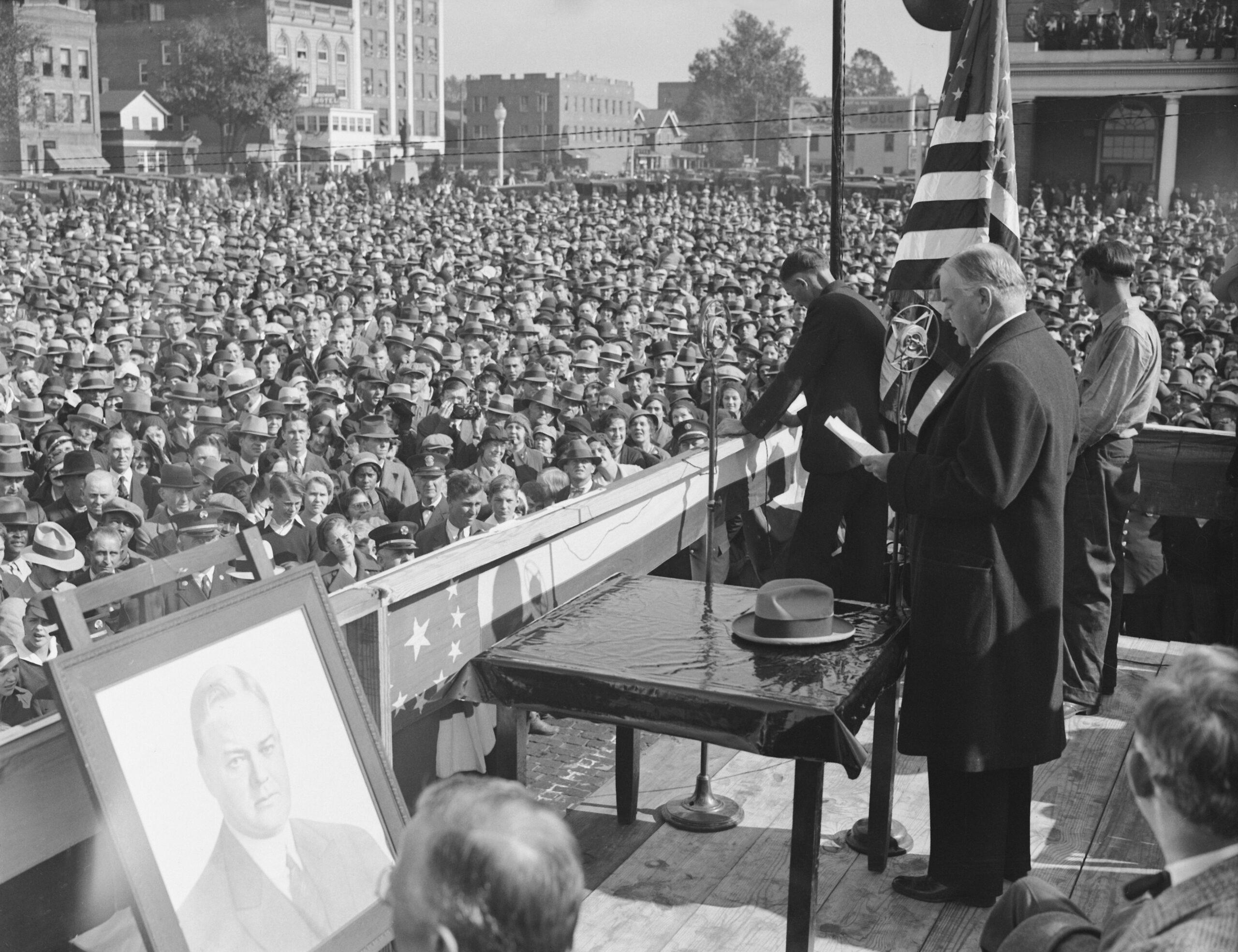
Hosts
About the episode
The 1920s and the 2020s share a special kinship. One hundred years ago, the U.S. was grappling with a mix of growth, technological splendor, and generational anxiety—a familiar cocktail (albeit from an era when cocktails were illegal). The era’s young people felt uniquely besieged by global forces. “My whole generation is restless,” F. Scott Fitzgerald wrote in This Side of Paradise. “A new generation dedicated more than the last to the fear of poverty and the worship of success; grown up to find all Gods dead, all wars fought, all faiths in man shaken.”
America was changing. And change always implies a kind of loss. We were moving toward cars and cities and manufacturing. And that meant we were moving away from horses and farmland and agriculture. And so, in 1930, just months into the Great Depression, Herbert Hoover signed a new piece of legislation to restore farmers to their previous glory. It was a great big tariff—the Smoot-Hawley Tariff. Rather than save the economy, it deepened the depression.
Today, the Smoot-Hawley Tariff is one of the most infamous failures in the history of American politics. To suggest that it holds lessons for this moment in history is to state the obvious. Our guest is Douglas Irwin, an economist and historian at Dartmouth University and an expert on the economic debates of the Great Depression. We talk about the economic motivations of the Smoot-Hawley tariff, the congressional debates that shaped it, the president who signed it, and the legacy it left. We talk about the economic instinct to preserve the past—an instinct that has never gone away in American history—and the profound irony that some efforts to return America to its former glory can have the unintended effect of robbing America of a richer future.
If you have questions, observations, or ideas for future episodes, email us at PlainEnglish@Spotify.com.
Summary
In the following excerpt, Derek and Douglas Irwin lay out the foundations for the Smoot-Hawley Tariff Act, beginning with the impact Herbert Hoover had on it.
Derek Thompson: So, let’s get settled in the 1920s. The economy is experiencing significant sectoral shifts. America was born as a farming economy, but agriculture is fading as a share of employment in the 1920s. The manufacturing sector is surging, construction is surging, the stock market is surging. What should we know about the U.S. on the eve of the October 1929 market crash that really prepares us for the story of the Smoot-Hawley Tariff?
Douglas Irwin: When we think of the 1920s, we think about the Roaring ’20s. We think about the jitterbug. We think about electrification. Cars are proliferating the economy. Things seem dynamic, but not all is well, of course. And you pointed your finger on exactly the sector that’s not doing well. It was still a large sector of the U.S. economy at the time. I think about a third of the labor force was in agriculture, and this was a holdover or hangover from World War I.
During World War I, obviously, there was a great conflict in Europe; the U.S. was sort of the breadbasket of the world. We were exporting a lot of our farm produce. Farmers are borrowing a lot of money to expand their operations, to buy new equipment, to get new land under cultivation. And the war suddenly comes to an end. Commodity prices fall because commerce is restored in Europe. They don’t need our imports quite as much. They go take the battlefields and put them back into agricultural production. And farmers are stuck. They’re stuck with these huge debts, lower farm prices, and throughout the 1920s, they’re really lagging. It’s a shrinking sector of the economy. There’s still the migration from the rural countryside into cities for work. And the story of Smoot-Hawley is a story that starts with agriculture.
Thompson: There are at least three figures that I want to introduce in this story. President Herbert Hoover, Congressman Willis Hawley, and Senator Reed Smoot. And I want to introduce them in that order. Let’s start with Hoover, whose modern reputation really belies his stellar reputation in the late 1920s.
Herbert Hoover was like the Forrest Gump of 1920s American politics. You mentioned the fact that American farmers were exporting all of this food to Europe during World War I. Who oversaw that effort? It was Herbert Hoover. He led the effort to evacuate Americans out of Europe in 1914. During the war, he oversaw the distribution of food relief in Europe. He sent millions of tons of American food to our European allies: so much that the historian Bill Bryson wrote that by 1917, it was reckoned that Herbert Hoover had saved more lives than any person in history. Under Calvin Coolidge in the 1920s, Herbert had so many jobs that he was known as the secretary of commerce and undersecretary of all other departments. He led the federal response to the Great Mississippi Flood of 1927.
It is hard to imagine somebody whose résumé was more perfectly suited to the presidency. On top of all of that, or maybe just filling out the muscle on the bones of what I just laid out there, Doug, what should we know about Herbert Hoover to set us up for the big tariff debate of 1929, 1930?
Irwin: He had a stellar reputation. He was known as being super smart. He was one of the best secretaries of commerce and the most influential, and his fingerprints are all over a lot of the good things that happened in the 1920s. So it seemed like an obvious thing for the Republican Party to put him up for the presidency after Calvin Coolidge. He’s a natural for the role. He was smart, he knew how to manage, he knew how to delegate and get things done. So even though he’s not the most charismatic of people, it seemed like he would sweep into the presidency and do a great job and manage the federal government well.
And so that’s what happened. He runs for office in 1928, Republican landslide, they do very well, and he’s elected president.
Thompson: So 1929, Herbert Hoover becomes president. His fame is built, in part, on the way that he has overseen the export of all of this food from America to Europe. He must know intimately the 10-year fortunes or misfortunes of the agricultural sector from the boom in the 19-teens to their struggles in the 1920s. What attitudes does Hoover pull into the presidency with regard to America’s farming sector?
Irwin: Well, he had campaigned on farm relief, that we’re going to do something to help farmers. And the question is: What do you do? The Republicans had tried throughout the 1920s a couple of things to help out farmers. So Congress twice in the 1920s passed price supports—that is, subsidies for farmers. Help them directly with their debts, help them directly with the prices they’re facing. Twice, those bills were vetoed by President Calvin Coolidge.
So the idea of using price supports or direct subsidies had some traction but never got through the presidency. So they changed tack. If subsidies were not going to work or subsidies were not politically viable, the idea was, well, we’ll go for tariffs, tariff equality. So tariffs were pretty high on manufactured goods, but they were lower on farm goods. So the idea was—and the farmers actually had demanded this for some time because they were purchasers of manufactured goods whose prices were inflated because of the tariff—you should either lower the tariff on manufactured goods or raise the tariff on farm goods to get that tariff equality.
And so that’s where the idea in the 1928 campaign came about. “We’re going to help you, farmers. We’re here for you. The Republican Party stands for you, and we’re going to pass a tariff in your interests.”
This excerpt has been edited and condensed.
Host: Derek Thompson
Guest: Douglas Irwin
Producer: Devon Baroldi
